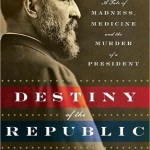On this last day of commemoration of the Battle of Gettysburg and the eve of Independence Day jubilation, veteran and armchair historian, Greg Johnson shares his reflections in this first guest post.
What follows began as a conversation with Greg about this week’s events. Even as a Canadian, I have been riveted to the re-enactments of the first person accounts and the historical narratives, both strictly factual and fictitious, that mark the Battle of Gettysburg. It is said that this battle ended it for the South, even though the war waged on for long after in other regions.
On the fields where almost 5,500 gave their lives and countless more and their kith and kin would toil to recover, Abraham Lincoln gave his brief, yet legendary, Gettysburg Address. The battle redefined civil war and entrenched the core values most important to America.
“Mind you, I don’t consider myself an expert by any means – just an armchair amateur history buff,” said Greg during our discussion. I suspected he was likely more well-read on this ‘stuff ‘ than the average American so I asked him to share his ideas.
At the time, he was reading: Destiny of the Republic: A Tale of Madness, Medicine and the Murder of a President by Candice Millard. We circled back to the topic that spurred the discussion – Gettysburg. The extraordinary 3-day battle which we not only commemorate this week, but we do so in a year that marks its 150th anniversary year. (Click here for Johnson’s personal notes on the book) and now… in his own words…..
Like many people, I first really became aware of what the American Civil War was all about by way of Ken Burns’ wonderful multi-part documentary. Since then, through various reading, I have come by a basic awareness of the major battles of the war – Bull Run, Shiloh, Fredericksburg, Chancellorsville – but it seems as though the epic three-day struggle at Gettysburg, just before Independence Day in 1863, has a particularly magnetic appeal.
Somehow the details of that battle have come to stand out more than those of other clashes.
We learned that this was General Lee’s greatest effort to bring the war to the north, moving his army into Pennsylvania and threatening to turn on Washington D.C. if he could outflank General Meade’s forces.
Of particular interest is the 20th Maine’s defense of Little Round Top on the second day of the fighting, in which the extreme Union left flank was held with a heroic bayonet charge. When contemplating this battle, we always are aware of how critical the Union victory here was to the north, as so many battles up to this point had been defeats or lost opportunities for the Union.
But the aspect I am drawn to the most – and I suspect this is true for many civil war enthusiasts – is the third day of the battle and “Pickett’s Charge.”
The image of those thousands of Confederate soldiers advancing across three-quarters of a mile of open ground, totally exposed to heavy Union fire, is a heartbreaking one, no matter which side of the conflict one’s ancestors fought on. It’s hard to imagine the faith those soldiers must have had in what they were doing to have made that charge, much less the bravery of it.
If I look for a moment in which I thought the scales tipped toward the preservation of the union, this has to be it. Abraham Lincoln and his contemporaries often spoke of how the war was an atonement in blood for the nation’s sins. And that charge, more than anything else I can think of, was the embodiment of that atonement.
Plan a visit to Gettysburg with this guide found online.
Widow of Gettysburg is a recently released novel by Jocelyn Green, whose guest post on its writing and inspiration appeared in an earlier WoW or Words on Wednesdays post on MilitarySuccessNetwork.com
Ms Green has also contributed a post on transition tips taken from her family’s direct experience with her husband’s move from military to civilian work and life.


Speak Your Mind